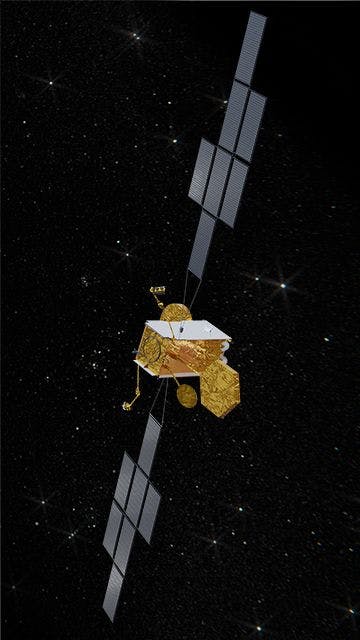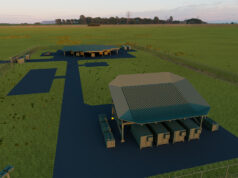The £500 million contract covers all aspects of the satellite’s development. From the design, manufacture, and assembly stages, to integration, testing and finally the launch of SKYNET 6A.
According to the Ministry of Defence, built by Airbus Defence and Space, SKYNET 6A satellites will provide fast, secure and reliable communications wherever they are deployed.
The design will feature electric orbit raising propulsion as well as electric station keeping systems.
“SKYNET 6A will use some of the most advanced technology available, including a higher radio frequency spectrum and the latest in digital processing to provide more capacity, speed and greater versatility than its predecessor system the SKYNET 5 constellation. The £500 million boost is the latest investment in the technological safeguards that help our Armed Forces deter threats from anywhere in the world, including Russia and China. This will secure UK leadership in defensive space and cyber operations for generations to come.”

Richard Franklin, Airbus Defence and Space UK Managing Director said:
“Airbus is extremely proud to be awarded this critical UK defence contract continuing our long tradition as the UK national milsatcom end-to-end services provider. Satellite manufacturing, linked to support services, is a critical component of the Government-industry UK space strategy and this contract underpins the UK MOD’s and industry’s lead position in this sector. Building this military satellite will, like Skynet 5, lead to significant export opportunities in the years ahead, growing high value manufacturing jobs and supporting a diverse supply chain in this increasingly important sector.
This contract for 6A demonstrates the strong working partnership we have with UK MOD, built on the success we have jointly achieved on the Skynet 5 system since 2003. Airbus is fully committed to delivering world-class military communications services to our Armed Forces across the globe, and look forward to delivering this step change in capability to the MOD.”
Discussing the previous generation of SKYNET satellites, Airbus say that the Skynet 5 programme, managed by Airbus, has provided the MoD “with a suite of highly robust, reliable and secure military communications services, supporting global operations since 2003”.
“Airbus has been involved in all Skynet phases since 1974 and this phase builds on a strong UK commitment to space manufacturing in the UK. The recent programme commenced by using the legacy Skynet 4 satellites and then augmenting them with a fully refurbished ground network before launching the Skynet 5A, 5B, 5C and 5D satellites between 2007 and 2012. The Skynet 5 programme has reduced or removed many of the technical and service risks for the MOD, whilst ensuring unrivalled secure satcoms and innovation to UK forces. Through the many years of delivering an exceptionally reliable Skynet service the Airbus teams have managed to significantly extend the lifespan of the Skynet satellites many years beyond their design life, offering significant additional value for money and capability to the UK.”
Defence Secretary Ben Wallace said:
“To safeguard our military on operations around the world we need to ensure that we protect their communications on land, sea or in air. The newest contested frontier is space and so we need to provide resilience and better communications for our forces. SKYNET 6A is one of many solutions we shall be investing in over the next decade. This Government recognises the urgent need to defend and promote space capabilities.”
Built and assembled in the UK, the SKYNET 6A contract will sustain 550 highly skilled jobs. Complete satellite integration will take place at Airbus facilities in the UK followed by testing using RAL Space testing facilities at Harwell in Oxfordshire supporting the UK Space Agency initiative for sovereign UK end-to-end satellite production and support.











Good. During the Falklands the U.K. had to ask the Americans nicely for access to their satellites. Sovereign should mean just that.
The Brits, Canadians, NATO, ect still use the vast array of American comms sats.
There are some aspects of UK comms we like to keep a bit more discreet though and its pretty handy having our own network. We also have some nations using ‘our’ networks too.
Well, we effectively are soon to have two of our own networks, Skynet and Oneweb. Depending on how the U.K. might exploit Oneweb, maybe with the ability to reserve bandwidth for military applications, I can actually see that being the more capable system in terms of bandwidth, latency and ground-level signal strength.
The cost though! Half a billion. Will there be a B. C, D, E like previous installations?
Just the one (for now) in this contract afaik.
GEO-based SATCOM is still expensive; good GEO MILSATCOM even more so; and this is the Rolls Royce of MILSATCOM! Not only is it trick military kit, SATCOM units are still (relatively) large and heavy so getting them out to GEO hasn’t seen falls in price like LEO launches have. I’d guesstimate the one launch could easily eat up 10% of that contract figure.
Actually GEO costs have come down thanks to the re-usability of SpaceX Falcon 9 boosters (main plus 2 side-strapped boosters needed to get to GEO) but they are still very expensive. A Falcon 9 GEO launch is about $150 million and an Ariane 5 about $220 million. Skynet satellites are so heavy that I suspect it would need a dedicated launcher as opposed to being one of a number of satellites in a shared payload. As WeeWill says, getting something heavy to GEO is still expensive.
It’ll be interesting to see what launcher is chosen. Given the Airbus connection probably Ariane but Falcon 9 Heavy would almost certainly be cheaper which is the way I would prefer it to go.
A Falcon 9 is perfectly capable of lifting Skynet. A Falcon 9 costs $62 million to launch but launch costs are dependent on a customer’s requirements. SpaceX charges the US Air Force $95 million per launch due to the extra security requirements imposed by the USAF.. These costs are coming down as more and more SpaceX rockets are being re-used. SpaceX just launched a South Korean military communications satellite using a booster used in May to launch two US astronauts to the International Space Station and successfully retrieved it.
We can sell the secure bandwidth to allies to recoup some, maybe even a lot.
Would we not want to use oneweb here instead?
Why did they have to call it skynet, have those people no understanding of popular culture and the ridiculous responses that name will get. Call yourself tulip and people will think your a bit of a plant.
It predates the Terminator movies. It’s a network in the sky – SKYNET 🙂
Probably exactly the place they got the name from for the films!
Dreadful name! Asking for trouble.